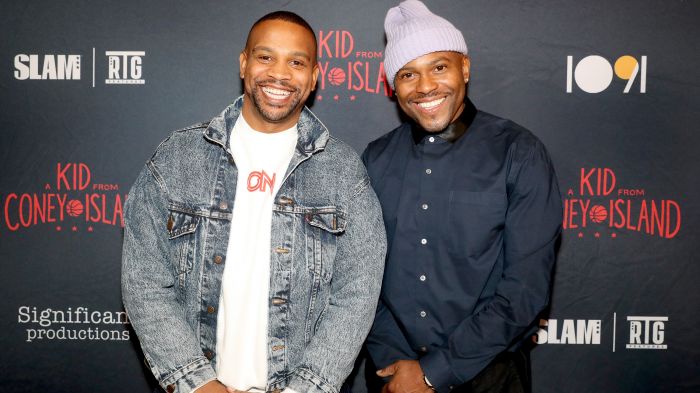Chike Ozah and Coodie Simmons Tell Stephon Marbury’s Story on Basketball, Depression and Moving to China
By Jazz Tangcay
LOS ANGELES (Variety.com) – When most people think of NBA stars, they often think of LeBron James, Steph Curry and Kobe Bryant. However, die-hard fans will remember Stephon Marbury, who entered the league at 19 in 1996, was a two-time All-Star and had a successful career in the Chinese Basketball Association.
The new film “A Kid From Coney Island” (bowing April 7 on Amazon Prime) traces his path as a young boy who grew up to play for the Minnesota Timberwolves, New Jersey Nets, Boston Celtics and the New York Knicks. He had a promising future.
In 2009, Marbury live-streamed a video of himself eating Vaseline and crying. It was something the media had a heyday over. But there was something else going on, another side to the story.
Filmmakers Chike Ozah and Coodie [Simmons] had been collaborators since 2002, working on music videos and short films, like “Muhammad Ali: The People’s Champ.” Neither knew much about Marbury, but Coodie did remember the Vaseline incident and how he was “ridiculed by the NBA.”
Producers Nina Yang Bongiovi and Forest Whitaker had approached the filmmakers asking if they wanted to explore Marbury’s story mentioning that he had since moved to China and had gone on to become a three-time champion for the Chinese Basketball Association. That’s when they were inspired to tell his story.
Both Coodie and Ozah followed the same philosophy in storytelling, to let the story tell itself. “It’s like a puzzle,” Coodie says. “I’m discovering things as we go.”
The storytelling journey took them to Beijing where Marbury had settled. There they sat down with him to hear his story, and Ozah observed how deeply philosophical Marbury was. “He’d start talking about his life and then he’d go down these rabbit holes,” explains Ozah.
The three of them learned that they had a lot in common — they had all lost their fathers.
“It was such a contrast to what we had heard in the media. We unraveled this depression and darkness. I never knew he had wanted to commit suicide,” admits Coodie. He says the media was mocking Marbury for the Vaseline incident, but they were oblivious to his depression because he had lost his father. “The media didn’t care about that,” Coodie says. “In China, we were able to see that side.”
After spending time with Marbury in China, the filmmakers returned to America where they sat down with his mother, sister and other people featured in the documentary.
In addition to the interviews, the documentary weaves in archival news footage of Marbury’s rise and time spent playing on the courts as a promising teenager. It was all about balance.
Jason Harper and Max Allman served as the documentary’s co-editors who helped find the right way to tell Marbury’s story and piece it together. The team chose to present the interviews from his family and former team players to show his love of the game and his athleticism.
“We had to pick the right moments to move the story forward,” says Ozah.
Marbury doesn’t appear on screen to tell his story until he moves to China later in the documentary. “The main thing from that point was that we wanted to take you inside his head so you knew what he was going through,” explains Coodie.
What’s next for the pair? They exclusively told Variety that they’ve just signed on as creative directors for basketball media company RTG Features, which means they’ll likely be telling more stories about the culture and world of the sport in the future.

